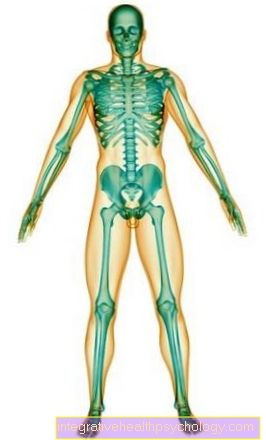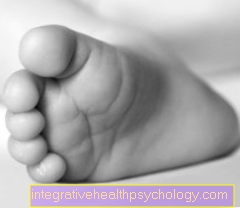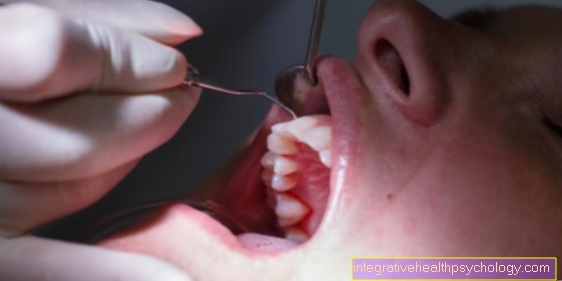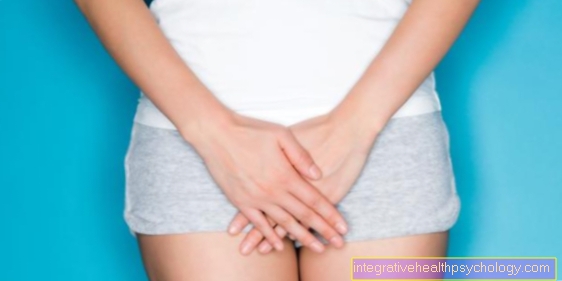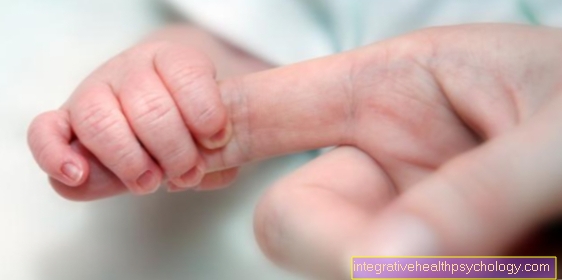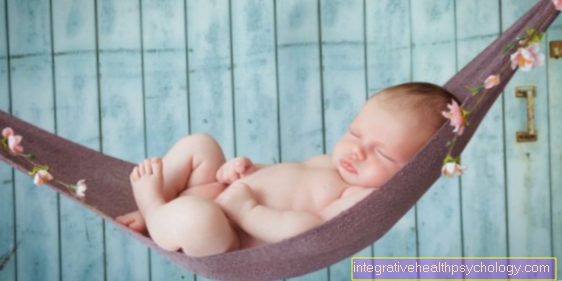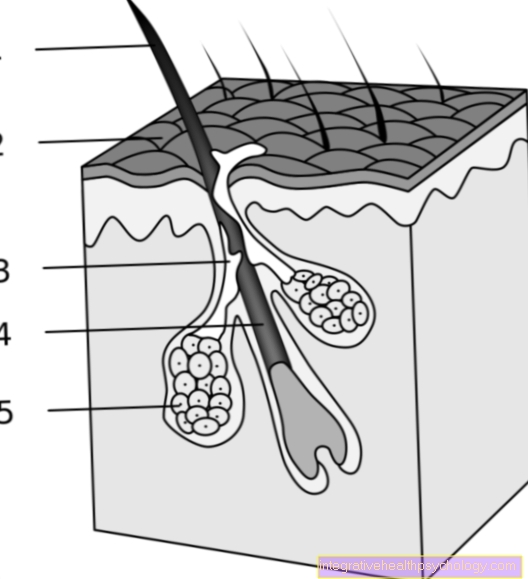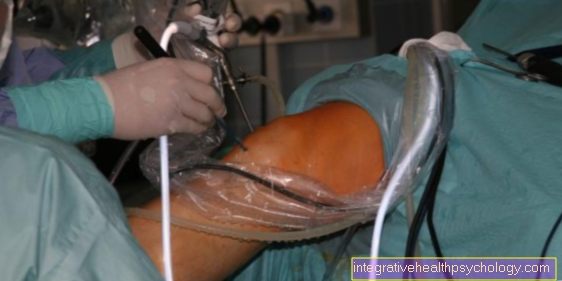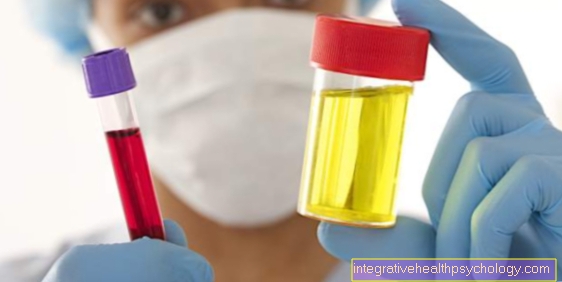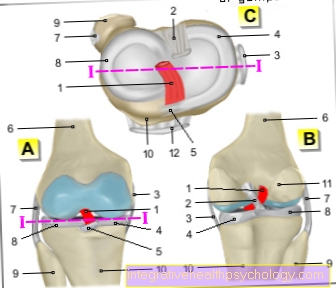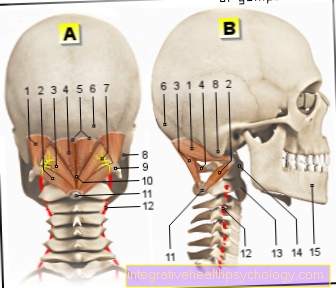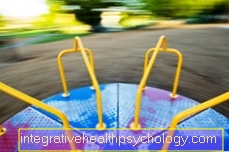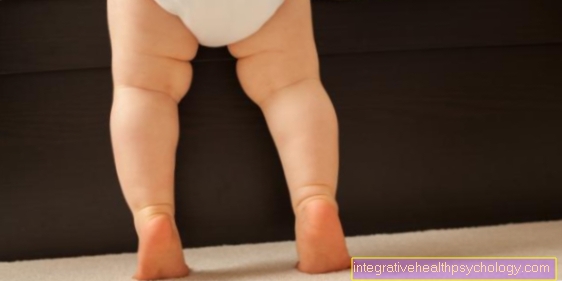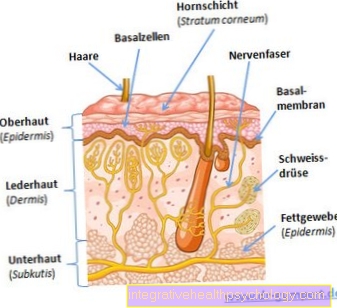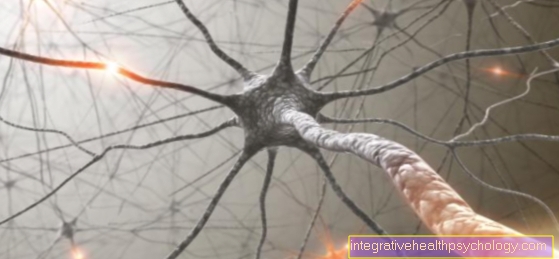Early pregnancy
introduction
One speaks of an early pregnancy when a woman is in the first 3 months of her pregnancy. In total, pregnancy lasts about 9 months. The period of pregnancy is divided into so-called trimena or trimester. The first trimester (1st trimester) refers to the first three months of pregnancy, i.e. early pregnancy. The next three months are called the second trimester (2nd trimester) and the last 3 months are called the third trimester (3rd trimester).
Overall, early pregnancy is considered to be the riskiest time for a pregnancy, as this is the most frequent time when the pregnant woman can lose her baby (miscarriage).
During the period of early pregnancy, the well-known pregnancy symptoms such as nausea, heartburn and food cravings often occur. The expectant mother's hormonal balance is in the process of changing, which is sometimes also responsible for the typical pregnancy symptoms.
Read more on the topic: 1st trimester

Signs of early pregnancy
Recognizing early pregnancy can be difficult for some women. Nevertheless, there are signs of early pregnancy, which do not necessarily occur in every woman and are perceived very differently.
An almost certain sign of early pregnancy is the absence of monthly bleeding. However, other signs, such as a pain in the abdomen or abdominal pain, are also typical of early pregnancy. Symptoms of pregnancy are often nausea, tiredness and excessive urination.
Further signs of early pregnancy can be feelings of tension in the breasts, as these begin to grow significantly in the period of early pregnancy and the fatty tissue in the breast is converted into milk ducts. An increased discharge (secretion) from the vagina can be a sign of early pregnancy, as well as mild circulatory problems. Furthermore, in early pregnancy there can be a sensitivity to smell, which is expressed, for example, in disgust at the smell of cigarettes or other smells. In addition, there is often a sudden increased urge to want to sleep with the partner (increased libido).
Read more on the topic: Signs of pregnancy
Process of early pregnancy
The process of early pregnancy is individual for every woman, but there are always certain parallels and certain times at which the unborn baby develops further. Overall, the complete course of a pregnancy is around 9 months, i.e. around 40 weeks.
This period of pregnancy is divided into trimena, whereby the first 3 months of pregnancy are the first trimester, the next three months the second trimester and the last three months the third trimester. The process of pregnancy is basically very similar for all patients.
In early pregnancy, the child develops very quickly, while at the same time the patient's body adapts to the unborn child. During this time, the mother-to-be's body is in a process of change and many pregnant women experience the pregnancy symptoms already mentioned.
In the first month of pregnancy, after the egg cell and sperm have fused, cells divide and form new ones. On the ultrasound during pregnancy you cannot see much in the first four weeks and therefore use a pregnancy test to prove pregnancy.
In the second month of pregnancy, the baby's heart begins to beat, and sprouts also form, which will later be recognized as arms and legs. The heartbeat can now be monitored by sonography (Ultrasonic) being represented. In the further course of early pregnancy, the appearance of a small person is increasingly defined. The baby develops many organs and is therefore no longer referred to as an embryo but as a fetus from the 11th week of pregnancy, since all organs are in place at this point, even if they are not yet fully developed. The further course of early pregnancy reveals more and more a small person, since arms, legs, fingers and toes are already formed.
Early pregnancy ends at the 12th week of pregnancy. For most women, this often ends the phase of nausea and constant fatigue. In addition, the likelihood of losing the unborn child after early pregnancy is much lower.
In general, the process of early pregnancy is quite uniform, but it can lead to a disturbed process of early pregnancy, which then often leads to the woman losing her child. An orderly flow of early pregnancy is therefore important for the unborn child. Harmful behavior on the part of the mother, for example through the consumption of alcohol or nicotine (see: Smoking during pregnancy), can cause lasting serious damage to the child in early pregnancy.
Read more on the topic: The course of a pregnancy
Flatulence in early pregnancy
The first 3 months of pregnancy, also known as early pregnancy, are often associated with various symptoms for the patient. Some patients suffer from gas in early pregnancy. This early pregnancy bloating can have various causes.
Often it has to do with the fact that the patient has digestive problems due to the new hormone constellation in her body that prepares her for pregnancy, which in turn can lead to flatulence in early pregnancy.
Furthermore, the unusual eating behavior in early pregnancy can cause flatulence. Another reason may be that towards the end of early pregnancy the fetus has already grown somewhat and the intestine responds to the tightness in the abdomen and pelvic area with flatulence.
In general, flatulence in early pregnancy is a bit annoying for the patient, but not at all bad and it often disappears again after a short time. Above all, it is important that the patient consciously pays attention to what she is consuming in early pregnancy, since gas can be used to minimize flatulence in early pregnancy. However, the flatulence in early pregnancy cannot be completely avoided. Some even view the gas as a sign of pregnancy.
Read more on the topic Flatulence in pregnancy
Bleeding in early pregnancy
Early pregnancy is a very uncertain time for many women as most of the abortions occur during this time. If bleeding occurs in early pregnancy, many women are very concerned that they may have lost their child.
It is very important to know that not every bleeding in early pregnancy means that the patient has suffered a miscarriage. It is much more common that bleeding in early pregnancy is due to the fact that the patient has a slightly disturbed hormonal balance during childbirth, which only levels off properly after a few months. During this time, lighter bleeding can occur again and again. In some women, bleeding occurs not only in early pregnancy, but also later.
It is especially important that the pregnant woman does not have any cramping abdominal complaints. If the bleeding lasts longer in early pregnancy, affected women should also consult their gynecologist. Even though bleeding is often normal in early pregnancy, it can also be a sign that the pregnant woman has lost her child. Particularly heavy bleeding in early pregnancy, which is also associated with pulling in the abdomen, can indicate a miscarriage.
Nevertheless, it is generally true that the pregnant woman should initially keep calm when bleeding in early pregnancy, as it is often harmless intermenstrual bleeding that disappears within a few days.
Read more about this under Spotting in early pregnancy
Abdominal pain in early pregnancy
In early pregnancy, many women suffer from various symptoms that can be traced back to the fact that the pregnant woman's body still has to get used to the child that is now growing in her womb.
Many women experience abdominal pain during early pregnancy. These usually occur in the morning and can be accompanied by nausea. Abdominal pain in early pregnancy is quite normal, as the baby begins to expand in the expectant mother's stomach and takes up more space. Nevertheless, the stomach pain in early pregnancy can be very stressful for the pregnant woman. In this case, the woman should try to relax again and again and do various relaxation exercises.
Pain medication is usually not recommended during pregnancy, but pregnant women who are plagued by abdominal pain during early pregnancy can take some medication after consulting their gynecologist. Most of the time, stomach pains go away on their own in early pregnancy.
Read more on the topic: Abdominal pain during pregnancy
Headache in early pregnancy
Some women experience headaches during early pregnancy, which can be very stressful. The reason for this is that there is an increased concentration of the pregnancy hormone progesterone in early pregnancy. This hormone causes the pregnant woman to suffer from headaches in early pregnancy. Headaches are quite normal, especially in the first few weeks of pregnancy.
In order to minimize headaches in early pregnancy, it is important that the pregnant woman drink enough fluids during the day. The best options here are water or unsweetened tea. Exercise in the fresh air is also very helpful against headaches in early pregnancy. Even a short walk can help the pregnant woman feel better and reduce headaches.
The headache usually disappears after the first few weeks and does not need further clarification. However, if the headache persists after early pregnancy, the patient should consult a doctor.
Read more about this under: Headache during pregnancy
Back pain in early pregnancy
Back pain in early pregnancy is a rather rare symptom compared to nausea or headache. Many women suffer from back pain during pregnancy, but this usually only occurs later in the pregnancy. Usually when the growing child and water retention lead to weight gain.
However, there are also women who describe back pain in early pregnancy. These can be caused by the pregnant woman twisting herself or the back pain caused by excessive tension.
If the back pain tends to occur in the lower back in early pregnancy, it is possible that the stretching of the uterine ligaments is causing the symptoms. In this case, the back pain should go away on its own within a few days.
Furthermore, in the area of the pelvis, the interconnected bones are loosened so that the child can later easily fit through the birth canal. This, too, can cause back pain to women in early pregnancy. A relaxing bath or warm compresses on the back can help alleviate the discomfort in the back. A massage can also be very helpful and ensure that women do not exacerbate the back pain in early pregnancy by tensing the muscles. Yoga exercises or pregnancy groups with sports participation can also help actively to do something about back pain in early pregnancy.
Read more on the topic: Back pain in pregnancy







